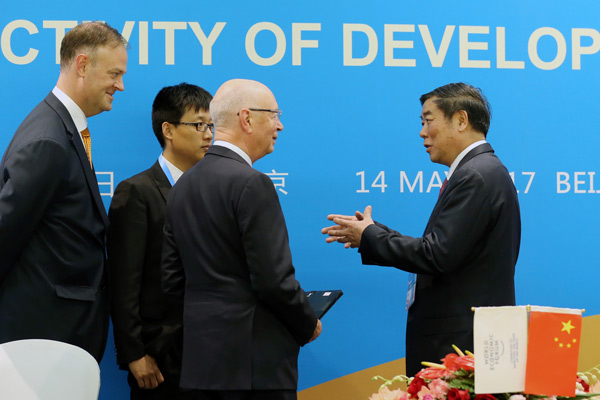
He Lifeng (right), head of the National Development and Reform Commission, speaks to Klaus Schwab, founder and executive chairman of the World Economic Forum, at the Belt and Road Forum for International Cooperation in Beijing on May 14.[Photo/China Daily]
The head of China’s top economic regulator called on May 14 for more policy coordination to support the Belt and Road Initiative in order to cope with challenges brought on by a growing anti-globalization trend that may put obstacles in key areas of cooperation.
Economies related to the initiative need to strengthen policy coordination in order to see further progress in implementing the initiative, said He Lifeng, minister of the National Development and Reform Commission.
President Xi Jinping proposed the idea to build the Silk Road Economic Belt and the 21st Century Maritime Silk Road in 2013.
“More progress can be achieved when all parties reach consensus to support and maintain an open world economy,” He said.
Efforts include establishing concrete plans to implement the initiative and building platforms to bridge companies and states, the minister said.
He made the comments during a session on connectivity of development policies and strategies on the sidelines of the Belt and Road Forum for International Cooperation on May 14.
China signed 12 cooperation agreements under the framework of the initiative with other countries including Singapore, Montenegro and Kyrgyzstan, as well as with international organizations such as the World Economic Forum and agencies within the United Nations.
“We emphatically share the spirit of the initiative-peace and cooperation, openness and inclusiveness, mutual learning and mutual benefit,” said Joan Clos, undersecretary-general of the UN.
“We hope to provide technical assistance and develop collaboration frameworks on the financing of sustainable urbanization, as part of efforts to achieve common goals shared by the initiative and our agency.”
Zhao Jinping, a senior researcher at the State Council’s Development Research Center, a government think tank, said policy coordination in particular is important for Chinese enterprises making outbound investment along the routes, because political uncertainties and some level of protectionism in some countries will pose challenges to investors.
Li Tie, head of the NDRC’s China Center for Urban Development, said policy coordination on risk management, tax policies and preferential policies of other types will be beneficial to supporting enterprises involved in the initiative.
Li said it will not take long to see improvement in trade and investment environment, with more infrastructural projects being built to fuel growth.
Direct investment made by Chinese enterprises in participating countries reached $50 billion during 2014-16, according to the Ministry of Commerce.
